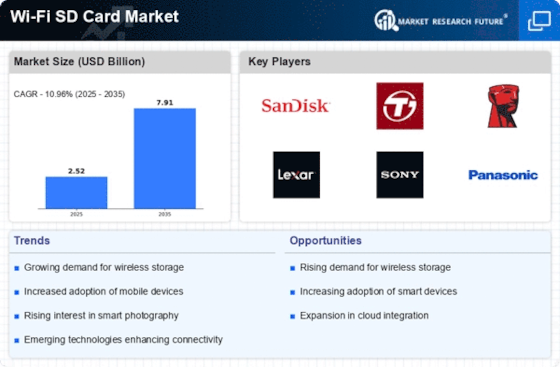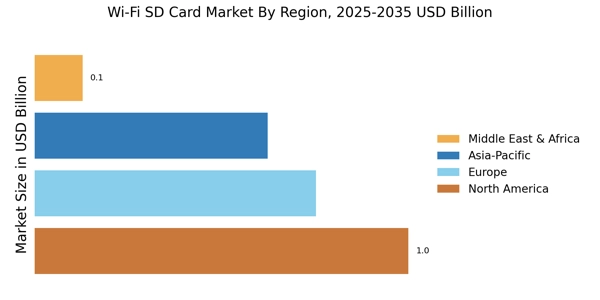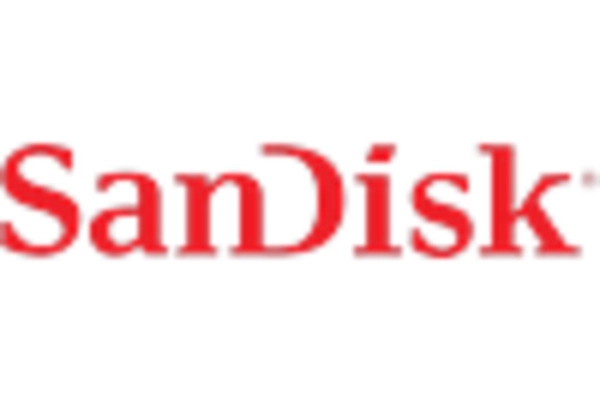Surge in Content Creation
The surge in content creation, driven by social media platforms and the rise of influencers, significantly impacts the Wi-Fi SD Card Market. As individuals and professionals increasingly produce high-definition videos and images, the need for efficient storage solutions becomes paramount. In 2025, the content creation market is projected to reach a valuation of over 100 billion, indicating a strong demand for storage devices that can handle large files. Wi-Fi SD cards offer the advantage of immediate sharing and backup, which is essential for content creators who require quick access to their data. This trend not only enhances the functionality of cameras and smartphones but also positions Wi-Fi SD cards as indispensable tools for modern creators. The growing emphasis on high-quality content suggests that the Wi-Fi SD Card Market will continue to expand in response to these evolving consumer needs.
Growing Need for Data Security
The growing need for data security is emerging as a crucial driver for the Wi-Fi SD Card Market. With increasing concerns over data breaches and privacy, consumers are becoming more vigilant about how their data is stored and shared. Wi-Fi SD cards that offer encryption and secure data transfer capabilities are likely to attract consumers who prioritize security. In 2025, the data security market is projected to reach 200 billion, highlighting the importance of secure storage solutions. As users become more aware of the risks associated with wireless data transfer, the demand for Wi-Fi SD cards that provide robust security features is expected to rise. This trend suggests that manufacturers will need to focus on enhancing the security aspects of their products to remain competitive in the Wi-Fi SD Card Market.
Rising Adoption of Smart Devices
The increasing prevalence of smart devices, such as smartphones, tablets, and digital cameras, appears to be a primary driver for the Wi-Fi SD Card Market. As consumers increasingly rely on these devices for capturing and sharing high-quality content, the demand for storage solutions that offer wireless connectivity is likely to rise. In 2025, it is estimated that the number of smart device users will surpass 3 billion, creating a substantial market for Wi-Fi SD cards. These cards facilitate seamless data transfer and remote access, enhancing user experience. Furthermore, the integration of Wi-Fi capabilities into storage solutions aligns with the growing trend of mobile computing, where users expect instant access to their files without the need for physical connections. This trend suggests a robust growth trajectory for the Wi-Fi SD Card Market.
Technological Innovations in Storage Solutions
Technological innovations in storage solutions are likely to propel the Wi-Fi SD Card Market forward. Advancements in flash memory technology and wireless communication protocols have led to the development of faster and more reliable Wi-Fi SD cards. In 2025, the market for flash memory is expected to grow at a compound annual growth rate of 10%, reflecting the increasing demand for high-performance storage devices. These innovations not only enhance data transfer speeds but also improve the overall user experience by enabling features such as remote access and cloud integration. As consumers seek more efficient ways to manage their data, the appeal of Wi-Fi SD cards, which combine storage and connectivity, becomes more pronounced. This trend indicates a promising future for the Wi-Fi SD Card Market as it adapts to the technological landscape.
Increased Focus on Remote Work and Collaboration
The increased focus on remote work and collaboration is influencing the Wi-Fi SD Card Market. As businesses adapt to flexible work environments, the need for efficient data sharing and storage solutions has become more pronounced. Wi-Fi SD cards facilitate easy access to files from multiple devices, making them ideal for collaborative projects. In 2025, the remote work market is anticipated to grow significantly, with more organizations adopting hybrid work models. This shift creates a demand for storage solutions that support seamless collaboration among team members. Wi-Fi SD cards, with their wireless capabilities, enable users to share and access data without the constraints of physical connections. This trend indicates that the Wi-Fi SD Card Market is likely to benefit from the ongoing evolution of work practices.
















